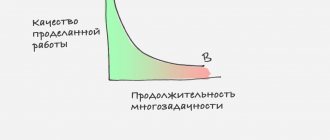Parents often notice that their child cannot concentrate on one thing for a long time. It manifests itself as forgetfulness and increased physical activity. Typically, this behavior is typical for preschoolers and schoolchildren and does not pose any threat.
But sometimes these symptoms indicate dissipated attention syndrome in children (MSD), which must be treated promptly. Otherwise, in the future, signs of the syndrome may affect the learning process and many aspects of a person’s life.
Common signs of SAD in children
The syndrome is accompanied by impaired mental activity. The student lacks concentration and cannot do one thing for a long time. Disturbances in social activity begin to appear: he may be withdrawn and thoughtful or, conversely, overly active.
Out of one hundred children, fifteen typically suffer from attention deficit disorder, which manifests itself in a variety of ways. The first signs of deviation can be detected between the ages of four and nine years, but can occur earlier. For example, a one-year-old baby may be overly active, but at the same time his concentration is impaired. At the age of three years, speech problems may appear.
It is worth remembering that manifestations of attention deficit may be different. There are the following types of violation:
- Only lack of attention;
- Impaired attention and impulsivity (mood often changes, can be irritable and aggressive);
- Attention deficit and hyperactivity (restlessness, constantly distracted by something);
- The mixed variety is the most difficult. Behavior is unpredictable, intellectual function is impaired.
Memory impairment in children: types, causes, correction, treatment
Sarklinik provides treatment for memory disorders in children and adults in Saratov, treatment of amnesia, treatment of memory and speech disorders in Russia, symptoms and syndrome of memory impairment, memory processes, disorders of immediate and short-term memory.
Sign up for consultation There are contraindications. Specialist consultation is required.
Text: ® SARCLINIC | Sarclinic.com \ Sarlinic.ru Photo: (©) Jaykayl | Dreamstime.com \ Dreamstock.ru The child depicted in the photo is a model, does not suffer from the diseases described and/or all similarities are excluded.
Related posts:
Acalculia, dyscalculia, treatment of acalculia
Vegetative vascular dystonia in children, treatment of VSD in Saratov
Sleepwalking in children, adults, treatment, somnambulism, sleepwalking
Very active child? Syndrome of movement disorders, disorders, motor disinhibition
Depression in adolescents, children, treatment of depression in Saratov
Comments ()
Causes of the syndrome
Before treating absentminded attention in children, you need to know what could trigger this illness. Unfortunately, scientists have not yet been able to establish the exact cause, but there are several hypotheses indicating that childhood illness may manifest itself due to the following factors:
- Hereditary predisposition. There is a gene responsible for behavior. Some of its features may cause manifestations of attention deficit.
- Trauma at birth. This may include brain damage, prolonged labor, asphyxia (oxygen starvation).
- Diseases of the expectant mother. If the mother was ill with something during pregnancy, this can lead to impaired fetal development, hypoxia and other negative consequences.
- Bad habits. During pregnancy, the mother could smoke, drink alcohol or use drugs.
- Rhesus conflict. It occurs if the mother’s Rh factor is negative and the baby’s is positive.
- Diseases of internal organs. In particular, the brain, kidneys, heart.
This syndrome is often associated with hyperactivity. And this is not without reason; with attention deficit, a person is too emotional, restless, and there is increased excitability. These signs also apply to hyperactive children.
All at once. What is Attention Deficit Disorder
In Russia, attention deficit hyperactivity disorder (ADHD) exists as an official diagnosis only for children. In the United States, until the 1970s, it was believed that attention deficit disorder went away on its own with age - but, according to recent data, approximately 50% of children suffering from the disorder continue to show symptoms of the disease years later (ultimately “adult” ADHD recognized by 18 European countries).
What are the signs of ADHD? There are three types of this disorder.
- More attention deficit. A person with this type of disorder resembles the hero Marshak from Basseynaya Street: he is absent-minded and forgetful, it is difficult for him to maintain attention on anything for a long time, and he does not listen to what he is told. Such people quite often seem stupider than they are - even with a high IQ, they find it difficult to both organize themselves and follow instructions. They quickly get tired of mental work, procrastinate and make stupid mistakes because they cannot focus on the details.
- More hyperactivity. This is a “man-motor”: it is physically difficult for him to remain still and behave calmly. Such people constantly sway in their chairs, dangle their legs and run out to smoke every 20 minutes; they distract not only themselves, but also those around them. Too much energy can also make you irritable or make it difficult to relax.
- All at once - there are symptoms from both categories. In any of the variants, the manifestations of ADHD concern different areas of activity and seriously interfere with life - a person experiences problems with concentration both at home and at work, and, for example, in line for tickets to a concert. If you are often unfocused, but this does not prevent you from coping with everyday tasks (here we do not mean tasks like “read all of Ulysses”, but rather about remembering important business meetings, not losing every month in metro personal documents or be able to prepare for the session), it is worth remembering the saying of psychiatrists: “No complaints - no diagnosis.” According to various estimates, the disorder affects 7–10% of children and 4–6% of adults worldwide.
Convenient diagnosis
ADHD remains one of the strangest and most controversial psychiatric diagnoses—the Wikipedia article on the history of debate surrounding the disorder reads like a thriller novel. Most likely, the controversy would be much less acute if it were not for the specifics of treatment: nature decreed that stimulants such as Ritalin and Adderall (an amphetamine derivative) best help with attention deficit disorder. In addition to the main therapeutic effects, these substances provide such interesting “side effects” as vigor, high mood, excess energy and frantic performance. All this did not pass the attention of the ordinary population - both mothers of families became interested in the substances (an episode about taking stimulants for other purposes is even in “Desperate Housewives”), as well as students of Ivy League universities, experiencing enormous academic loads. As a result, ADHD turned out to be a very convenient diagnosis for a number of brave citizens who decided to increase their personal effectiveness with the help of chemistry, and the flair of a “screen for drug dealers” still remains around the diagnosis.
Nevertheless, according to many respected doctors, attention deficit disorder really exists, including the World Health Organization. In addition, it has quite noticeable neurobiological manifestations - people with ADHD have a thinner cerebral cortex, more precisely those parts of it that are responsible for attention and cognitive control. So, for lack of a better option, they continue to use the diagnosis.
Evolutionary advantage
The second area of debate surrounding ADHD is whether it should even be considered a disorder rather than a normal variation in brain function. American psychotherapist and entrepreneur Tom Hartman created the “hunter and farmer” theory, according to which patients with ADHD retained the genes of primitive people responsible for behavior useful to hunters - quick reaction, impulsiveness, receptivity, the ability to quickly switch attention from one object to another, and especially the ability to hyperfocus (immersion in solving one problem to the detriment of all others).
In general, these people are just slightly in the wrong era: they could well be the champions of the tribe in tracking down prey in the forest, but instead they are forced to sort through papers in the office. Perseverance, calmness and organization are now valued much more than spontaneity and the ability to quickly switch attention from one thing to another - although this largely depends on the profession.
Psychiatrist Dale Archer adheres to a similar position: ADHD does not need to be treated - you just need to slightly correct it and use your natural qualities as intended. “Such people make excellent researchers, businessmen, athletes and specialists in creative professions,” the professor wrote in one of his books. Such theories are reinforced by periodic coming outs from successful entrepreneurs - including, for example, multi-billionaire Richard Branson, the creator of IKEA, Ingvar Kamprad, and the founder of three airlines (Morris Air, JetBlue Airways and Azul Brazilian Airlines) David Neeleman. Scientists believe that the genetic factor actually plays a large role in the occurrence of the disease: as Archer writes, studies of twins show that in more than 70% of cases, the syndrome found in one will also be found in the other. And if a child is diagnosed with this, the likelihood that one of the parents has attention deficit disorder is 15–40%.
How to live with ADHD as an adult in Russia
As I already said, a person who has emerged from puberty is not given such a diagnosis in our country. Those who suspect they have this disease can take a small test, developed by psychiatrists with the assistance of the World Health Organization, purely for themselves. There are only six questions in it:
- How often, after completing the most difficult part of a task, do you have problems finalizing the details?
- How often do you find it difficult to sort everything out when you are given a task that requires organization?
- How often do you forget about appointments or commitments?
- When you are given a task that requires a lot of mental effort, how often do you try to put off completing it or avoid the task altogether?
- How often do you fidget or move your arms or legs when you have to sit still for long periods of time?
- How often do you feel too active and restless, as if you have a motor inside you?
For each question you are asked to choose one of five answer options: 1) very rarely; 2) rarely; 3)sometimes; 4) often; 5) very often. For each answer from “sometimes” to “very often” in the first three questions and for “often” or “very often” in the rest, give yourself one point. If you score four or more, it looks like you actually have attention deficit disorder. However, this test does not replace examination by a psychiatrist.
Ritalin and Adderall are prohibited in Russia, so in any case there would not be many options for drug treatment: mainly a drug called “Strattera” is used, which is not a psychostimulant, and nootropics (amusing symmetry - phenotropil, beloved by many in Russia, is considered such in America as illegal as Ritalin in our country). But, fortunately, in many cases it is possible to achieve improvement without medication - as with other disorders, such as depression and bipolar disorder, cognitive behavioral therapy is effective here. Self-medication with caffeine helps some people - which is theoretically logical, since it acts in much the same way as stimulants, only milder. True, its effect has not been clinically proven—scientists receive conflicting results. But the good effect of regular physical activity has been proven - it increases the ability to concentrate and plan.
Finally, there are many techniques for self-organization and increasing efficiency. You can use a ready-made algorithm like David Allen’s Getting Things Done or customize your own system of reminders, organizers and calendars. And try to use the positive aspects of your neurobiological characteristics - curiosity, multitasking and the ability to quickly process information.
Daria Varlamova: Drama Queen. What is Histrionic Personality Disorder
People with hysterical disorder live as if on stage all the time and pay great attention to external effects
Daria Varlamova: An echo of pain. What is Post Traumatic Stress Disorder
How to live with the feeling that the world is unsafe
Symptoms of distracted attention
The set of symptoms of absent-minded attention in a child directly depends on his character, social living conditions, upbringing, age, and severity of the disorder. Therefore, you first need to be able to correctly recognize the first signs of the syndrome. They may be:
- Inability to concentrate for a long time both at home and at school;
- Restlessness and carelessness;
- He cannot understand the words spoken to him or simply does not listen;
- Lack of self-control;
- He finds it difficult to follow rules and instructions;
- Tendency to disorder, things are always scattered on the desk, toys are on the floor;
- When doing something, he is distracted by any little things;
- Absent-mindedness and frequent loss of one's belongings;
- Forgetfulness associated with impaired attention;
- Tendency to anxiety;
- Problems with communication (with children, adults, teachers);
- Impatience and obsession;
- Increased speech activity, and the child cannot listen to the interlocutor and interrupts him;
- Inability to learn, new information is not perceived in full, difficulty in writing;
- Cannot finish what he starts;
- Bad behavior, the child is noisy, constantly spinning and waving his arms.
It is very important to monitor your child and at the first symptom that appears, begin to pay more attention to him.
Features of the diagnosis of SRV
Distracted attention syndrome is a behavioral disorder, not a mental disorder, so establishing an accurate diagnosis can be problematic. Individual manifestations may arise due to improper upbringing or personal characteristics.
It is necessary to resort to subjective diagnostic methods, among them are:
- Special questionnaires. They must be filled out not only by the student, but also by parents and teachers.
- Observation. It is necessary to monitor behavior while staying somewhere and at home.
- Psychological examination. It is important to identify intellectual abilities and skill impairments.
- Identification of diseases. Perhaps early illnesses of the child or his mother could have caused the appearance of this disease.
You need to make sure that your child has absent-mindedness syndrome, because restlessness and activity are also common in many healthy children. There is no doubt about the presence of the disease in the following cases:
- Constant symptoms of the disorder not only at home, but also at school, while out and about.
- Parents discovered the first signs in preschool age, and they did not go away for six months.
- Attention disorder interferes with a child’s learning; he cannot adapt normally to a team.
Treatment methods
We'll tell you what to do if your child has distracted attention. There are several correction methods. First of all, you need to remember about an integrated approach: one thing is not enough; you may need both drug therapy and sessions with a psychologist.
Proper nutrition and adherence to a convenient training regimen play an important role. At this time, a lot depends on both parents. Not only the mother, but also the father should participate in the fate of the child. They must create a daily routine for their child and always find time for him. This is the only way to raise a completely healthy child.
Medication method
Medicines are not always prescribed, only if serious attention problems have been identified in the child, worsening his quality of life and preventing him from socially adapting to the team.
Under no circumstances should you prescribe medications for your child on your own, even if there are many laudatory reviews about them. The medicine should only be prescribed by the attending physician!
Taking some sedatives may be indicated to reduce children's nervous excitability. In childhood, potent drugs are contraindicated, therefore, along with sedatives, they may prescribe tablets aimed at improving brain activity, for example, Glycine (an alternative is Biotredin), or improving blood supply to the brain (Phenibut).
Schedule
If a child suffers from lack of attention syndrome, then a clear daily routine is indispensable. Parents must demand that their children comply with it. This is the only way to instill discipline, which is sometimes absent even in healthy children.
The daily routine should be compiled and printed, hanging in a place convenient for the child, for example, above a desk or bed. Be sure to leave a few hours of free time so that the child can do what interests him.
Here is an example of a daily routine, you can change it according to your preferences:
| Time | Action |
| 07:00 — 07:05 | The child wakes up |
| 07:05 — 07:20 | Exercise, hygiene |
| 07:20 — 07:35 | Breakfast |
| 07:35 — 08:00 | Getting ready for school |
| 08:00 — 08:30 | Road to school |
| 08:30 — 13:05 | Lessons |
| 13:05 — 13:30 | Way home |
| 13:30 — 13:40 | Changing clothes, hygiene |
| 13:40 — 14:00 | Dinner |
| 14:00 — 16:00 | Free time, sections |
| 16:00 — 18:00 | Doing homework |
| 18:00 — 18:30 | Dinner |
| 18:30 — 20:00 | Free time |
| 20:00 — 21:00 | Preparation for sleep |
| 21:00 — 07:00 | Night sleep |
If poor attention and excessive activity interfere with studying in a regular school and communicating normally with his peers, then it may make sense to transfer him to an institution where he is taught according to an adapted program, or switch to home schooling. To make such a decision, you need to consult with different specialists to hear several opinions.
Classes with a psychologist
This stage should not be neglected - it is mandatory. A psychologist will help you get rid of excessive emotionality and impulsiveness. The child will become calmer, behave better, be able to adapt better in a given situation, and will try to concentrate in classes.
Usually classes with children are carried out in a playful way. The psychologist models certain situations and closely monitors the child’s behavior. If necessary, gives advice on what to do in a specific situation.
Psychologists also use a variety of relaxing techniques that will help the child get rid of accumulated tension. Therefore, psychological training is very important for attention disorders.
Parental control
Parents should take an active part in the treatment process. A child with an attention disorder requires special upbringing, and first of all, you need to give your child more independence.
The baby must perform certain household duties. Of course, they don’t have to be very complicated; they are selected depending on the age and physical fitness of the child. You need to give him tasks that he can handle, for example, washing dishes, dusting, or putting away toys.
At first, the child may not succeed in everything; you should not actively help him. He must learn to be persistent when trying to complete tasks on his own. Don’t forget about rewards; you need to praise your child for successfully completing a particular task.
You can resort to sports by sending your child to some section or working out with him yourself. Sport helps to waste excess energy for health benefits, and also teaches self-organization and discipline.
Recognition of the disease
Diagnostics for detection in domestic medicine is observation of behavior. In this case, monitoring is carried out in a familiar environment for an objective assessment of the level of thinking, activity, and concentration. They even attached a certain scale to this - behavioral assessment.
The observation is carried out professionally by a child psychiatrist for at least six months. He relies on information received from the school psychologist and assesses the family situation.
To fully collect symptoms and if in doubt, the doctor has the right to prescribe additional examinations in the form of an MRI or computed tomography. Confirming the diagnosis is a very important process. Therefore, brain blood flow scans are often performed. It has been noted that people with this behavior have weak function of the cerebellum and its appendages. All ongoing monitoring shows a more clear picture of the activity of the brain and, in particular, the cerebellum.
From the editor: Common types of damage to the nervous system
The main cause of the deficiency is in the functions of the brain, but it also affects other vital organs, such as vision, smell, touch, hearing, including internal thinking and emotions, speech impairment occurs, and perception is dulled.
All symptoms in the form of fussiness, anxiety, lack of attention are the body’s defensive reaction to external stimuli that the brain is not able to cope with on its own.
Preventing problems during pregnancy
You need to start thinking about your child’s health even before conception. The expectant mother should give up bad habits if she has them and carefully monitor her health. Complicated pregnancy or difficult childbirth are often the cause of the development of the syndrome. After childbirth, you need to protect your baby from infectious diseases, possible injuries and other negative influences.
Even infants need developmental activities. You can show your baby bright objects and talk about their purpose. Of course, the baby will not understand what is said, but he will concentrate on the bright colors and familiar voice. A little later, age-appropriate educational toys should be used.
Many parents struggle with attention disorder. This problem is especially relevant for younger schoolchildren. Without qualified help, a child will not be able to concentrate on a particular activity for a long time, and will begin to experience problems in communication and learning. Therefore, it is very important to help him in a timely manner. You should start with a visit to a child psychologist.
Adviсe
Hug your child more often, show him your care and love.
Parents should show their feelings, demonstrate their love and care. You must try to devote as much time as possible to the child, hug and kiss him, show that you value him, despite all the problems and shortcomings. Increase your self-esteem. Send your child to sports or creative clubs. This will allow you to achieve certain successes, which will bring you joy and make you feel important. Don't forget to praise your baby even for the slightest victories. Always remember that your child needs to properly organize his daily routine so that he has time to rest. Remember that fatigue aggravates the condition of a baby with this syndrome. Learn to set tasks correctly. Formulate them in simple words so that the child understands what is required of him. Create a daily routine and follow it, thereby disciplining your baby
Editor's note: Treating depression with hypnosis
It is important to do this gently, without pressure. Be patient and be confident. Try to always be calm
Remember that your child can copy you. If the child is already attending school, you cannot do without the help of a teacher. It is important that parents talk to the teacher, explain the current situation to him, and be able to enlist his support. It is possible that it will be necessary to transfer the child to an institution where an individual approach to upbringing and education is used.
https://youtube.com/watch?v=9FIyLOPczGc
Now you know what symptoms may indicate the presence of DV syndrome in a child
It is important that parents do not remain idle and have the opportunity to provide timely help to their child if they need to seek advice from a psychotherapist. Remember that the behavior of a child with a lack of attention can be corrected.










